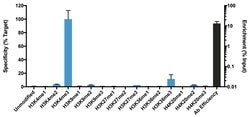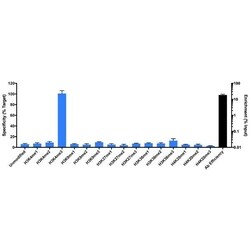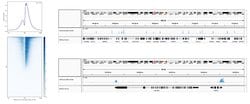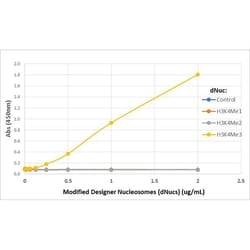Learn More
Invitrogen™ H3K4me3 Recombinant Rabbit Monoclonal Antibody (RM340), ChIP-Verified
Description
This product reacts to Histone H3 trimethylated at Lysine 4 (K4me3). No cross reactivity with monomethylated Lysine 4 (K4me1), dimethylated Lysine 4 (K4me3), or other methylations in histone H3. Click here for Master Lot linking information.

Specifications
Specifications
| Antigen | H3K4me3 |
| Applications | ChIP Assay, ChIP sequencing (ChIP-seq), ELISA, Luminex |
| Classification | Recombinant Monoclonal |
| Clone | RM340 |
| Concentration | 1 mg/mL |
| Conjugate | Unconjugated |
| Formulation | PBS with 50% glycerol, 1% BSA and 0.09% sodium azide |
| Gene | H3C15 |
| Gene Accession No. | P68431, Q71DI3 |
| Gene Alias | B0035.7; BUR5; CELE_T10C6.12; CG31613; CG31613-PA; CG33803; CG33806; CG33809; CG33812; CG33815; CG33818; CG33821; CG33824; CG33827; CG33830; CG33833; CG33836; CG33839; CG33842; CG33845; CG33848; CG33851; CG33854; CG33857; CG33860; CG33863; CG33866; Dmel\CG31613; Dmel_CG31613; F07B7.10; F07B7.3; F08G2.2; F17E9.13; F35H10.1; F45F2.4; F54E12.5; F55G1.10; H02I12.7; H3; H3 histone; H3 histone family, member A; H3 histone family, member I; H3 histone family, member K; H3 histone family, member L; H3 histone family, member M; H3 histone, family 2; H3 histone, family 3A; H3 histone, family 3B; H3 histone, family 3B (H3.3B); H3 histone, family 3B.1; H3 histone, family 3C; H3 K4; H3.1-221; H3.1-291; H3.1-I; H3.2; H3.2-221; H3.2-614; H3.2-615; H3.2-616; h3.2a; H3.3A; H3.3B; H3.5; H3/A; H3/b; H3/d; H3/f; H3/i; H3/j; H3/k; H3/l; H3/M; H3/n; H3/o; H3-143; H3-291; H3-3A; H3-3b; h3-5; H3-53; H3-614; H3a; H3b; H3-B; H3C1; H3C10; H3C11; H3C12; H3C2; H3C3; H3C4; H3C6; H3C7; H3c8; H3f; H3-F; H3F1K; H3F2; H3F3; h3f3a; H3F3B; h3f3b.1; H3F3C; h3f3d; H3FA; H3FB; H3FC HIST1H3C; H3FD; H3FF; H3FH; H3FI; H3FJ; H3FK; H3FL; H3FM; H3FN; H3g; H3h; H3i; H3K4; H3Lys4me3; h3r; HHT1; HHT2; his-12; his-16; his-19; his-21; His3; his-3; His3:CG31613; His3:CG31613-PA; His3:CG33803; His3:CG33806; His3:CG33809; His3:CG33812; His3:CG33815; His3:CG33818; His3:CG33821; His3:CG33824; His3:CG33827; His3:CG33830; His3:CG33833; His3:CG33836; His3:CG33839; His3:CG33842; His3:CG33845; His3:CG33848; His3:CG33851; His3:CG33854; His3:CG33857; His3:CG33860; His3:CG33863; His3:CG33866; his-30; his-33; his-43; his-47; his-51; his-53; his-57; his-61; his-65; his-68; his-7; Hist1; Hist1h3a; HIST1H3B; Hist1h3c; Hist1h3d; HIST1H3E; Hist1h3f; hist1h3g; hist1h3g.L; HIST1H3H; Hist1h3i; HIST1H3J; hist2h3; HIST2H3A; Hist2h3b; HIST2H3C; Hist2h3c1; Hist2h3c2; Hist2h3c2-ps; Hist2h3ca1; Hist2h3ca2; HIST2H3D; histone 1, H3a; histone 1, H3b; histone 1, H3f; histone 1, H3h; histone 2, H3a; histone 2, H3c; histone 2, H3c2; histone 2, H3ca2; Histone 3; histone cluster 1, H3a; histone cluster 1, H3b; histone cluster 1, H3f; histone cluster 1, H3g protein L homeolog; histone cluster 1, H3h; histone cluster 2, H3a; histone cluster 2, H3c; histone cluster 2, H3c2; histone cluster 2, H3c2, pseudogene; histone gene complex 1; Histone H2A; Histone H3; histone H3.1; Histone H3.2; histone H3.3; Histone H3.3C; histone H3.5; Histone H3/a; Histone H3/b; Histone H3/c; Histone H3/d; Histone H3/f; Histone H3/h; Histone H3/i; Histone H3/j; Histone H3/k; histone H3/l; Histone H3/m; histone H3/o; Histone H3K4me3; histone variant H3.5; hypothetical protein LOC550262; K06C4.11; K06C4.3; M32461; methyl Histone 3; methyl Histone H3; N2749; PP781; SIN2; T10C6.12; T23D8.6; Trimethyl H3; Tri-methyl H3; Trimethyl Histone H3; Tri-methyl Histone H3; Tri-Methyl-H3 K4; Tri-Methyl-H3 Lys4; Tri-Methyl-Histone H3 K4; Tri-Methyl-Histone H3 Lys4; wu:fa25h06; wu:fa96g06; wu:fb07a08; wu:fb36f01; XELAEV_18028537mg; YBR010W; YBR0201; YNL031C; zgc:110292; zgc:174300; zgc:56193; zgc:56418; zgc:64222; zgc:86731; ZK131.10; ZK131.6 |
| Show More |
By clicking Submit, you acknowledge that you may be contacted by Fisher Scientific in regards to the feedback you have provided in this form. We will not share your information for any other purposes. All contact information provided shall also be maintained in accordance with our Privacy Policy.





